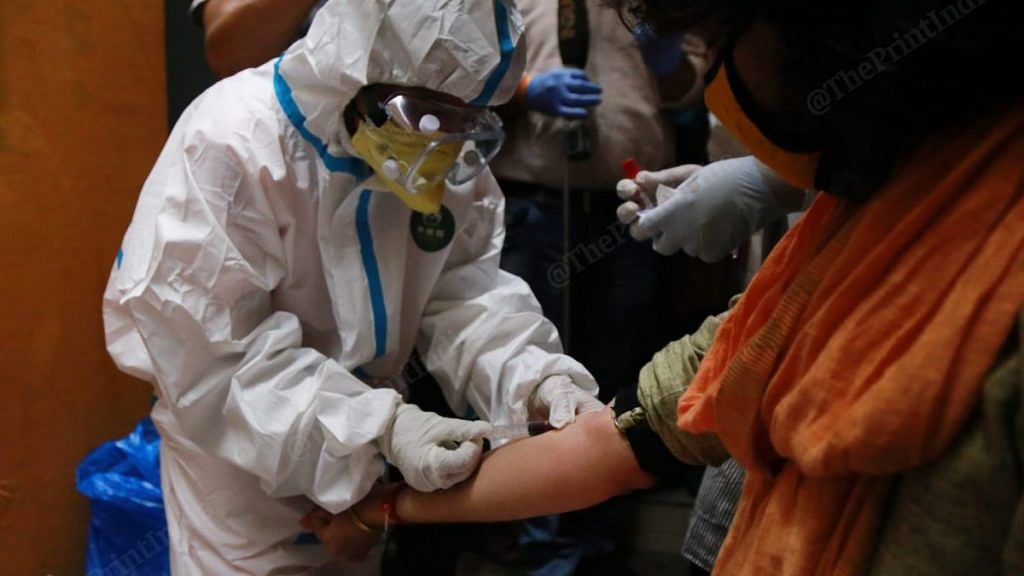New Delhi: The Delhi High Court directed the Aam Aadmi Party government to submit the results of the third serological survey, conducted in the national capital in September, before making the results public.
Th court’s order Wednesday was in response to an affidavit submitted by the Delhi government stating that the results of the survey are still being compiled.
According to the affidavit, the third serological survey began on 1 September and was completed only on 15 September, and therefore will require more time to be finalised.
Serological surveys are an exercise aimed at detecting the true exposure of a population to a disease. They involve testing blood samples for antibodies and thus help detect even those people who may have recovered from the disease on their own without requiring medical assistance. In the case of Covid-19, this would include asymptomatic patients who unknowingly contracted and recovered from the disease.
Also read: Nurses at Delhi hospital protest not being paid for 3 months, North MCD says AAP govt to blame
Delhi govt claims results are being prepared
The affidavit submitted by the AAP government was in response to the court asking it, on 8 September, to place the results of the survey on record.
The high court accepted the government’s submission but rapped it for making similar submissions in the past and not following through with it.
“It has been noticed that on the previous occasions too, such a submission was made on behalf of the Delhi Government and we had accommodated learned ASC (additional soliciting counsel) only to find that the Sero Surveillance report was made public on the very next date,” the court said.
In view of this, the court directed the government to submit the results of this survey and a comparison report with the other two surveys before publicly releasing the details.
While the Delhi government maintains that the results are still being compiled, reports have already started to emerge claiming that the third sero survey results are ready and reveal the highest seroprevalence in the population since the beginning of the pandemic.
However, the Delhi government’s Director General of Health Services, Dr Nutan Mundeja dismissed these reports.
“As we have stated in court, we are still in the process of compiling the results. We will submit the report in court and then declare it to the public,” Mundeja told ThePrint.
Two serological surveys have already been conducted in Delhi. The first survey, conducted between 27 June and 10 July, revealed that 22.6 per cent of those surveyed had been exposed to the virus. In the second survey that was conducted between 1 August and 7 August, the seroprevalence had increased to 29.1 per cent.
Unlike the previous two surveys, which were conducted district-wise, the third serological survey was conducted ward-wise and has a sample size of 17,000 people.
Also read: Delhi Rt value on rise though tests up 3 times, experts say people ‘lax’ in taking precautions
‘Ramp up RT-PCR tests’
The court also expressed concern that the Delhi government was conducting more Rapid Antigen Testing rather than the Reverse Transcriptase Polymerase Chain Reaction (RT-PCR) tests, which are considered as the gold standard for testing.
“Delhi government ought to focus on shoring up the capacity of testing through RT-PCR, so that testing through RT-PCR is scaled up substantially. Only on enhancing the testing capacity can more persons be tested through RT-PCR,” the court said.
According to the government’s affidavit, Delhi has a capacity of conducting a total of 15,100 RT-PCR, CBNAAT and TrueNAT tests every day.
CBNAAT, TrueNAT and RT-PCR are all molecular tests with similar levels of accuracy in detecting SARS-CoV-2, but all three use different machines and kits.
The affidavit also revealed that in the period between 8 September to 15 September, a total of 3,14,767 antigen tests were conducted, against only 83,951 RT-PCR and the other two tests.
The court noted that Delhi should increase its RT-PCR testing capacity as rapid antigen testing has questionable accuracy.
ThePrint had reported earlier that the focus on rapid antigen tests made false negatives a massive worry. A Delhi government report revealed that nearly 18 per cent of rapid antigen tests sent for follow-up RT-PCR tests came back positive.
The court also asked an expert committee formed by the Delhi government and the Lieutenant Governor to decide on how RT-PCR testing capacity will be ramped up.
The court asked the committee to file a report before the next hearing on 30 September.
Also read: Positive in Delhi, negative in Jaipur — Nagaur MP’s curious Covid reports
